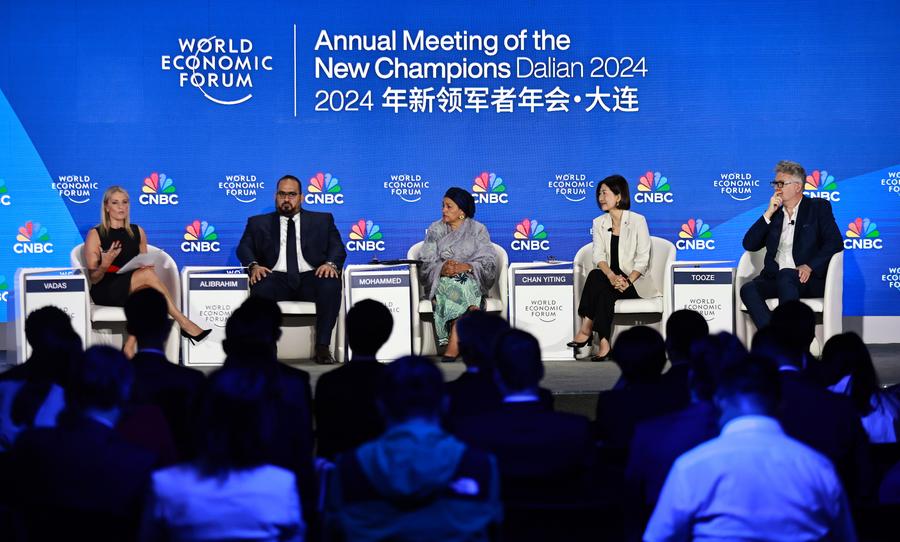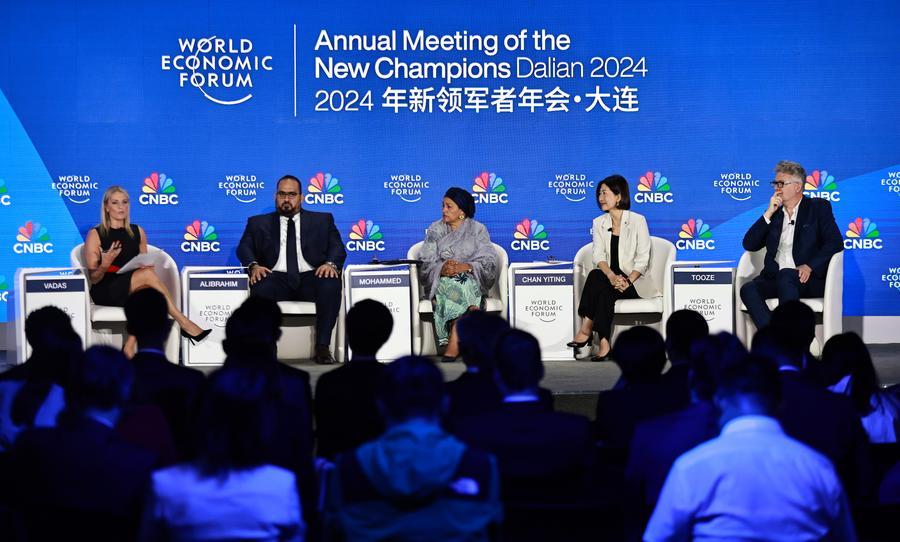Guests attend a sub-forum during the 2024 Summer Davos in Dalian, northeast China's Liaoning Province, June 25, 2024. (Xinhua/Yang Qing)
DALIAN, June 26 (Xinhua) -- Attendees for the 15th Annual Meeting of the New Champions, also known as the Summer Davos, have called for increased international collaboration to address challenges of energy transition and climate change.
Liu Zhenmin, China's special envoy for climate change, emphasized the need to enhance cooperation and avoid protectionism measures to facilitate energy transition and combat climate change.
Global and regional cooperation is needed in this endeavor, Liu told a panel discussion at the three-day event held in northeast China's city of Dalian.
Liu acknowledged that Asian countries, which have a lion's share of global coal consumption, face significant challenges in transitioning to cleaner energy sources.
He refuted the Western accusations of overcapacity in China's clean energy sector, highlighting instead the strong global demand for renewable energy products.
"We need to continue to encourage and support our enterprises to build up the capacity and produce more products," Liu said. He added that China's manufacturing sector has contributed to reducing the global prices of solar and wind products.
To meet its dual carbon commitments and help fight the climate crisis, China has been vigorously developing and establishing its new energy sector. It has been the world's largest market for new energy vehicles for years.
China is also a major supplier of wind and solar power equipment and power batteries. It has driven down the cost of renewable energy and helped some other countries obtain clean, reliable, and more affordable energy, providing 50 percent of the world's wind power equipment and 80 percent of global photovoltaic equipment.
Liu's viewpoints were echoed by Kim Sang-hyup, co-chairperson of the Presidential Commission on Carbon Neutrality and Green Growth from the Republic of Korea (ROK).
Kim highlighted the potential for cooperation among China, Japan and the ROK in developing a green industrial ecosystem.
More cooperation dialogues are needed as the cooperation should expand to other parts of the world, including ASEAN and African countries, Kim stated.
Delegates from the leading Chinese power and battery companies have joined in the call for cooperation.
Wen Shugang, chairman of China Huaneng Group, a major power company in China, called for more global cooperation to eliminate protectionist barriers and mitigate geopolitical influences so that technologies can work better for the well-being of humanity and the protection of the Earth.
"Tackling climate change and promoting energy transition is a common responsibility for all of humanity," Wen said.
With the pledges of achieving carbon peak by 2030 and carbon neutrality by 2060, China is firmly committed to low-carbon and clean energy development and that is why the country has made great achievements in this respect, Wen said.
Wen emphasized that China's clean energy technologies can benefit developing countries, as there is a huge low-carbon market demand for affordable Chinese solutions.
Robin Zeng, founder and chairman of battery giant CATL, proposed a "sharing model", or win-win model, to allow the distribution of production capacity to span from the resource countries to China and the market countries.
Zeng said CATL is willing to license technologies to battery makers in other countries and help build the industry there. "Climate change and sustainability are so important for everyone," he said.





 A single purchase
A single purchase









